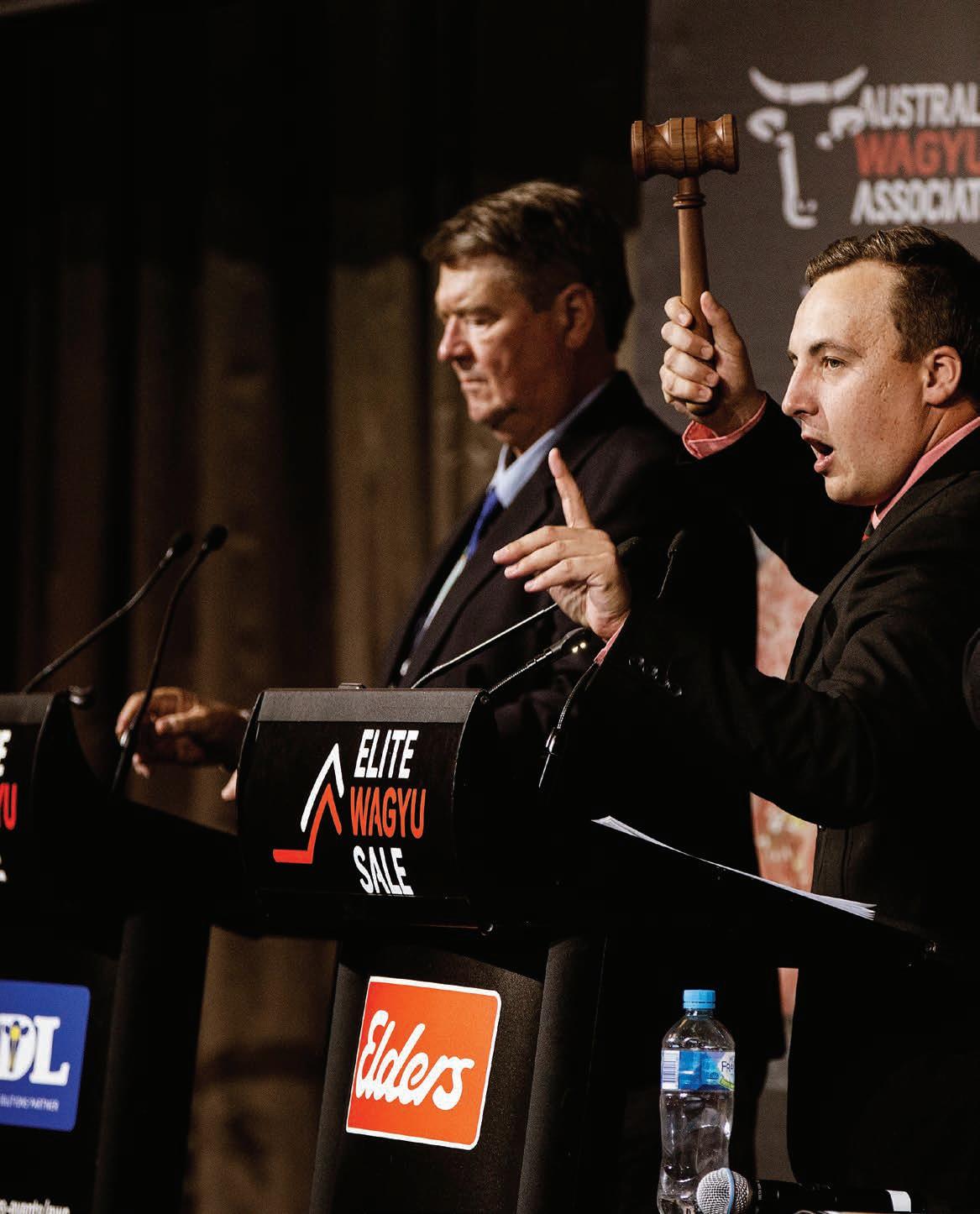
5 minute read
WAGYU HALL OF FAME
HONOUR FOR CATTLE KING PETER HUGHES
Most people roll out of a campdraft with a few happy memories under their belt; a good run, maybe a prize of two. For Peter Hughes it was an impassioned chat with a mate that set him on the path to becoming a pioneer of the Australian Wagyu sector and one of the nation’s most revered cattlemen.
The Queensland cattle producer and owner of one of the world’s biggest, privately owned Wagyu beef herds, Hughes was recently inducted into the Wagyu Hall of Fame.
Accepting the honour at the Australian Wagyu Association’s annual WagyuEdge 2022 Conference in Melbourne, a humble Hughes shared his gratitude for the Australian Wagyu Society, and paid tribute to the many pioneers of the Wagyu sector.
“My mind spins when I think of all the incredible pioneers of the breed, and I feel very much indebted to the Wagyu family, |and to the Australian Wagyu Association,” Hughes said.
“It’s a wonderful society, a wonderful breed of cattle, and we’ve made a success of it which is very gratifying.”
With society president Charlie Perry at the helm, Hughes expressed confidence in the future of the association, and the strength of the Australian Wagyu sector.
“The Australian Wagyu Society has been led by so many good people and the work that’s been done is incredible. I think a really good sign is Charlie doing a wonderful job,” Hughes said. “He’s the younger generation coming along, which really shows you how vibrant the society is.”
Travelling from the centre of the family’s cattle empire at Tierawoomba in Central Queensland, Hughes shared an incredible journey that has seen the Hughes’ family, and its two cattle companies, Georgina Pastoral and Hughes Pastoral, expand across three million hectares throughout Central Queensland and Northern Australia.


Hughes hails from a Hereford family, starting with Brahmans in the early 1950s. In those days he was as strong a barracker for the breed as any other North Queensland cattle producer. Hughes recalls listening to a CEO announce at a cattle conference in Brisbane that 'if you haven’t got Brahman cattle, you’re not serious about the cattle industry’.
But times change, and so do expectations. Having ordered one too many a tough steak - better off nailed to your boot, he declares - Hughes decided Australia had to lift its game to produce a product that could compete with chicken and pork.
On the campdraft circuit at the time with his neighbour and friend Wally Rea, now a fellow Wagyu Hall of Fame recipient, Hughes was treated to many compelling discussions on the benefits of Wagyu.
“He could talk about nothing else but Wagyu cattle, he’d only heard about them but he was convinced that they were the way of the future,” Hughes says.
Hughes went on to purchase some of Wally Rae’s early bulls after he imported Japanese genetics to America, and later embryos and semen to Australia.
Under Hughes’ care, the breed proved its hardiness in the searing, outback landscape.
Their docility and fertility made for strong weaning rates and ability to survive periods of drought.
It was a bold direction in a time when the introduction of Wagyu in Northern Australia was unchartered territory. Former managing director of Rangers Valley Meets and AACo Don Mackay says many were left behind in Hughes’ wake, himself included.
“In hindsight, it’s amazing the confidence Peter had and his readiness to back his judgment and belief in the Wagyu with his own money and family commitment when so many people in the industry were saying he would fail. To run against the tide like that is the mark of someone with vision, who is strategic and has a good streak of entrepreneurship,” Mackay said in a recent interview with The Weekly Times. The enormous herd is now past its fifth generation of Wagyu crossing, and has been a 30 year process for the Hughes’ family of selecting full Wagyu bulls from their own stud with the Brahman-Hereford cross cows that Tierawoomba had previously run for many years.
The family is also leading the way in the consolidation of Australia’s pastoral properties, having recently added Victoria River District cattle stations Inverway and Riveren, and Stanbroke’s Miranda Downs Station to its portfolio.
Hughes and wife Jane, and sons Sam and Fred and their families run Georgina Pastoral Company across three stations; Caldervale in Central Queensland, Lake Nash in the Northern Territory, and Keeroongooloo in the Channel Country.
Today the family’s dedication has paid off. Estimated at a conservative $600 million, The Australian newspaper’s 2021 Rich List ranks Hughes as the nation’s 91st wealthiest.
But as told in a 2007 interview with The Financial Review, Hughes isn’t one for fancy holidays or houses - “holidays work well in theory, but they are not for me.” Instead, it’s all put back into improving the land, business, and the future of the Wagyu sector in Australia.
“It’s a great feeling; I can’t think of a better way to spend it,” Hughes told The Weekly Times recently.
“There’s no quick fixes in this industry; I always like to say that the fastest way to move cattle is slowly. That’s true of everything. If you try to take a short cut, you will fall in a hole and it will take you half as long again. That’s not my way.”




